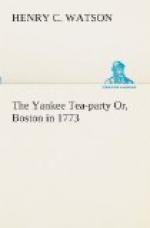Nobody offered any show of fighting for the tea.
We cut open the hatches, and some of the men went
down and passed up the chests, while others cut ’em
open and emptied the green stuff into the water.
The crew of the vessel were afeard to stir in stopping
us, for we told ’em we’d shoot the first
man who interfered. I tell you, there was quick
work there. When we had cleared that ship of
the tea, we hurried off to the others, Pitts still
leading the way, and did the same kind of work for
them. The people began to crowd on the wharf,
and some of ’em came to help us. I guess
there was about a hundred and fifty of us on the third
ship, all hard at work passing up the chests, cutting
’em open and spilling the tea. Within two
hours, about three hundred and fifty chests of the
tea were thus destroyed. The crowd cheered us
once in a while, and we knew we’d have friends
enough if the red-coats attempted to attack us.
When we had emptied the last chest that could be found,
we gave three of the loudest cheers and gained the
wharf. A drummer and fifer were ready, as Mr.
Brown and Mr. Hanson can inform you, and we formed
a procession and marched up to this tavern. Here
the crowd gave our band of Mohawks cheer after cheer
ond then dispersed. But we didn’t intend
to end the night’s work so quietly. We had
a supper prepared just where we are now eating, and
Josiah Quincy and some other big men came to join
us. We made a night of it, I tell you. Pitts,
I think, got very drunk, so many wanted to drink with
such a bold patriot.”
Pitts was rather disposed to deny the assertion that
he was actually drunk; but Kinnison and Colson said
it was a fact, and he, at length, admitted that he
was considerably excited, perhaps beyond the command
of his reason. The company laughed at this ‘getting
around the stump,’ and one of the young men
proposed that Pitts’ health should be drank in
a glass of ale. The beverage was ordered and
the health of the patriot drank with a hearty relish.
The work of demolishing the eatables then went bravely
on.
“Mr. Kinnison,” said Mr. Colson, “there’s
one incident concerning that tea-party that has slipped
your memory. As our procession moved from the
wharf and passed the house of the tory Coffin, Admiral
Montague raised the window, and said, ’Ah! boys,
you have had a fine evening for your Indian caper;
but mind, you’ve got to pay the fiddler yet!’
Pitts here shouted, ’Oh! never mind, never mind,
squire! Just come out, if you please, and we’ll
settle that bill in two minutes!’ The people
shouted, and the admiral thought he had better put
his head in in a hurry.”
“That’s true,” remarked Kinnison.
“Well, you see, my memory is poor. Pitts
would have mentioned it but for his modesty.”
“I recollect it well,” said Pitts.
“If that tory Coffin had shown his face that
night, I wouldn’t have given three cents for
his life.”
“I think I would have had a slash at him,”
observed Kinnison. “I felt as savage as
a Mohawk on a war-path.”




